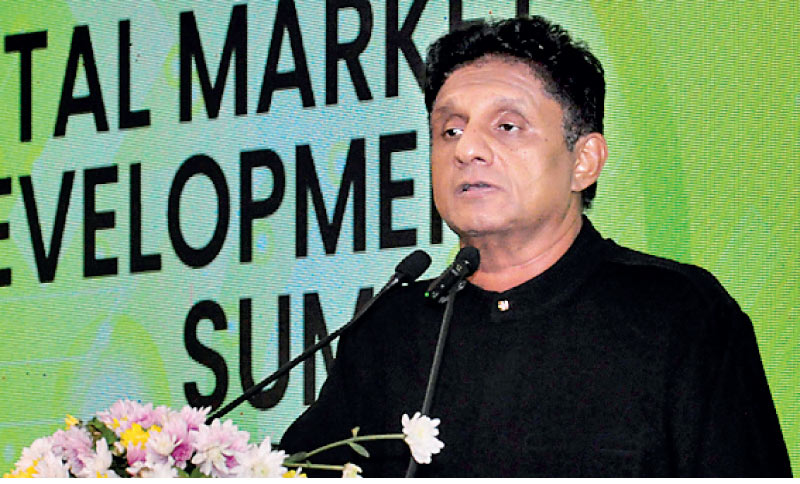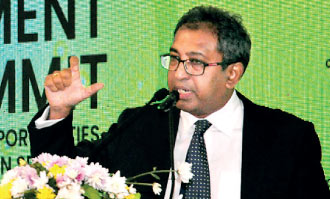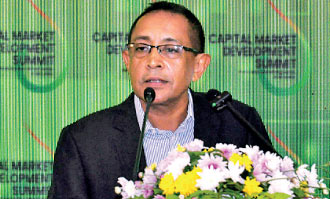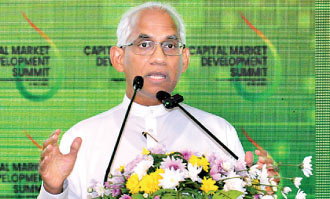Saturday Feb 14, 2026
Saturday Feb 14, 2026
Monday, 12 August 2024 00:47 - - {{hitsCtrl.values.hits}}

Opposition Leader Sajith Premadasa

MP Dr. Harsha de Silva

MP Kabir Hashim

MP Eran Wickramaratne
Opposition Leader Sajith Premadasa on Friday met with the business community in the run-up to his bid for Presidency, and detailed his vision for transforming the nation’s fortunes and driving growth and foreign investment in a production economy.
During the program titled ‘Challenges and Opportunities for Capital Market Development’, hosted by the Samagi Jana Balawegaya (SJB), Premadasa outlined his vision to transform the Colombo Stock Exchange (CSE) into a vibrant and competitive hub capable of attracting significant foreign interest.
Premadasa was candid in his assessment of the current state of the CSE, which he described as lagging far behind its regional peers. “When we look at the present situation, it exhibits a very sorry state. The CSE has had virtually negligible progress in the last 30 years,” he remarked, noting the exchange’s average daily turnover of just $ 5.4 million pales in comparison to India’s $ 14.3 billion and Thailand’s $ 1.2 billion. This disparity, he argued, has driven foreign investors to seek opportunities elsewhere, depriving Sri Lanka of much-needed foreign capital.
Premadasa’s vision for revitalising the CSE is ambitious. He proposed the establishment of a technologically advanced, multi-asset cross-exchange, which could connect to regional and international exchanges. “We propose a multi-asset cross-exchange connected to numerous regional and international exchanges. This infrastructure will attract foreign investment by offering a reliable and efficient trading environment, enhancing liquidity and market depth,” he explained.
In addition to technological advancements, Premadasa emphasised the need for structural reforms within the CSE. He pointed out that the exchange is currently owned by 15 stockbroking firms, a situation that has stalled progress for over two decades due to unresolved issues related to its ownership structure. “We have to resolve this long-standing issue of the ownership structure and other relevant issues in a swift manner,” he urged.
Premadasa also stressed the importance of Government participation in the stock market, which he noted has been virtually non-existent in recent years. He pledged to implement systems that would encourage transparent and ethical investments by Government institutions, while also promising to combat crony capitalism. “We will never ever encourage crony capitalism to be the norm. That will certainly be negated and eradicated,” he declared.
In a bid to attract foreign investment, Premadasa suggested leveraging the Port City as a hub for global fund management companies, offering them incentives similar to those available in Dubai and India. He also mentioned the potential for setting up a regulated cryptocurrency exchange, although he stressed that this would only be pursued after thorough study. “It is very important to ensure that appropriate studies are conducted prior to embarking on such an initiative,” he noted.
Premadasa advocated for the inclusion of capital market education in school curricula to increase financial literacy and investment awareness among the public. “We will expand school curricula regarding the capital markets, thereby increasing awareness about investments, creating a society that is doing financially so much better,” he said.
Beyond the specifics of his capital market strategy, Premadasa took the opportunity to critique the current administration’s handling of the economy, particularly in its dealings with international financial institutions. He vowed to renegotiate deals with organisations like the IMF to secure better terms for Sri Lanka. “We will ensure with the requisite people’s mandate that we will talk with the IMF and other international financial institutions to ensure that the voice of the Sri Lankan people is heard” he asserted.
Adding to the discourse, MP Kabir Hashim highlighted inefficiencies in the current financial system, particularly the over-reliance on traditional banking for long-term financing. “Our financial system is not equipped to handle the demands of modern economic development. We need a more robust capital market that can better match the supply and demand for capital,” Hashim said. He stressed the need for reforms that would allow for diversified funding sources, enabling businesses to access the capital they need to grow.
MP Dr. Harsha de Silva, who also spoke at the event, echoed the call for fiscal discipline and sustainable public finance management. He remarked: “We cannot afford to continue on this path of fiscal indiscipline. We need to make tough decisions to ensure that our public finances are sustainable in the long run.” de Silva also pointed out the opportunities arising from recent legislative reforms, suggesting that they could be leveraged to drive economic recovery if coupled with sound economic policies.
– Pix by Sameera Wijesinghe –